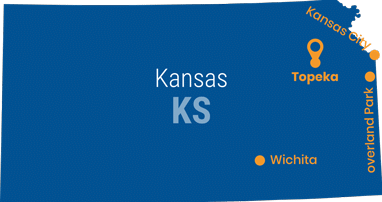What Career Options are Available for Finance Majors?
Are you considering pursuing a finance degree program in Kansas? This major is relatively popular among college students in the United States, but particularly so for individuals interested in money management, banking, and/or economics. While programs vary, most are designed to provide students with a wide variety of technical skills that can be applied in almost any industry. The finance field is also closely related to business, with much of the knowledge and skills gained easily transferrable. As a result, graduates tend to be generally well-prepared for employment in many different professions.
While standards and responsibilities vary, most finance professionals provide assistance to individuals, companies, and/or organizations as they develop financial plans, strategies, and/or forecasts. They may work with personal and/or corporate finances, although most select a preferred concentration.
It’s important to realize that earning a degree in finance can lead to a wide variety of professional employment opportunities in Kansas. The field is expansive, with jobs available in many different industries. As money management and investment are integral parts of most businesses, most companies and organizations can utilize professionals of this type to some extent. This has a huge impact on the kind of work performed. Daily responsibilities depend largely on the position obtained, as well as employer size and expectations.
Some of the most common finance careers are accountant and auditor. Their duties are fairly standard, with professionals spending time preparing and examining financial records, identifying possible areas of opportunity/risk, and providing potential solutions to problems. In many cases, they are responsible for ensuring financial operations run smoothly. This often entails examining financial statements, computing taxes owed, inspecting account books for efficiency, making best-practice recommendations to management, and suggesting ways to reduce costs while improving profits.

Featured Online Programs
Top Ranked Campus & Online Finance Programs in Kansas
Kansas State University
Score: 84.23
- Undergraduate Tuition
- In-State: $10,942
- Out-of-State:$27,816
- Net Price: $18,745
- Acceptance Rate: 79%
- Retention Rate: 87%
- Graduation Rate: 70%
- Total Enrollment: 19,745
- Undergrad Students: 15,113
- Graduate Students: 4,632
- Grads Salary: $74,000
- Student-to-faculty: 18:1
University of Kansas
Score: 83.9
- Undergraduate Tuition
- In-State: $11,700
- Out-of-State:$29,412
- Net Price: $18,322
- Acceptance Rate: 88%
- Retention Rate: 85%
- Graduation Rate: 69%
- Total Enrollment: 28,406
- Undergrad Students: 20,696
- Graduate Students: 7,710
- Grads Salary: $75,000
- Student-to-faculty: 17:1
Friends University
Score: 81.08
- Undergraduate Tuition
- In-State: $32,748
- Out-of-State:$32,748
- Net Price: $22,579
- Acceptance Rate: 56%
- Retention Rate: 70%
- Graduation Rate: 61%
- Total Enrollment: 1,927
- Undergrad Students: 1,460
- Graduate Students: 467
- Grads Salary: $76,000
- Student-to-faculty: 14:1
Newman University
Score: 78.22
- Undergraduate Tuition
- In-State: $35,500
- Out-of-State:$35,500
- Net Price: $19,315
- Acceptance Rate: 48%
- Retention Rate: 71%
- Graduation Rate: 54%
- Total Enrollment: 2,787
- Undergrad Students: 2,398
- Graduate Students: 389
- Grads Salary: $69,000
- Student-to-faculty: 13:1
Washburn University
Score: 76.29
- Undergraduate Tuition
- In-State: $9,578
- Out-of-State:$20,582
- Net Price: $12,894
- Acceptance Rate: 100%
- Retention Rate: 69%
- Graduation Rate: 53%
- Total Enrollment: 5,663
- Undergrad Students: 4,930
- Graduate Students: 733
- Grads Salary: $68,000
- Student-to-faculty: 13:1
Wichita State University
Score: 76.07
- Undergraduate Tuition
- In-State: $9,322
- Out-of-State:$19,240
- Net Price: $14,184
- Acceptance Rate: 95%
- Retention Rate: 68%
- Graduation Rate: 51%
- Total Enrollment: 16,741
- Undergrad Students: 12,856
- Graduate Students: 3,885
- Grads Salary: $74,000
- Student-to-faculty: 20:1
Pittsburg State University
Score: 75.43
- Undergraduate Tuition
- In-State: $8,008
- Out-of-State:$19,692
- Net Price: $19,357
- Acceptance Rate: 88%
- Retention Rate: 78%
- Graduation Rate: 58%
- Total Enrollment: 5,722
- Undergrad Students: 4,426
- Graduate Students: 1,296
- Grads Salary: $68,000
- Student-to-faculty: 15:1
Fort Hays State University
Score: 73.73
- Undergraduate Tuition
- In-State: $5,633
- Out-of-State:$16,811
- Net Price: $13,774
- Acceptance Rate: 92%
- Retention Rate: 77%
- Graduation Rate: 48%
- Total Enrollment: 12,843
- Undergrad Students: 10,206
- Graduate Students: 2,637
- Grads Salary: $65,000
- Student-to-faculty: 14:1
Benedictine College
Score: 73.39
- Undergraduate Tuition
- In-State: $34,800
- Out-of-State:$34,800
- Net Price: $28,451
- Acceptance Rate: 76%
- Retention Rate: 80%
- Graduation Rate: 65%
- Total Enrollment: 2,465
- Undergrad Students: 2,391
- Graduate Students: 74
- Grads Salary: $68,000
- Student-to-faculty: 15:1
Rasmussen University-Kansas
Score: 71.83
- Undergraduate Tuition
- In-State: $15,340
- Out-of-State:$15,340
- Net Price: $17,320
- Acceptance Rate: 100%
- Retention Rate: 50%
- Graduation Rate: 50%
- Total Enrollment: 333
- Undergrad Students: 333
- Graduate Students: 22
- Grads Salary: $70,000
- Student-to-faculty: 11:1
McPherson College
Score: 66.7
- Undergraduate Tuition
- In-State: $35,162
- Out-of-State:$35,162
- Net Price: $25,490
- Acceptance Rate: 84%
- Retention Rate: 65%
- Graduation Rate: 52%
- Total Enrollment: 788
- Undergrad Students: 788
- Graduate Students: 7
- Grads Salary: $64,000
- Student-to-faculty: 13:1
Midamerica Nazarene University
Score: 63.68
- Undergraduate Tuition
- In-State: $36,120
- Out-of-State:$36,120
- Net Price: $29,992
- Acceptance Rate: 73%
- Retention Rate: 61%
- Graduation Rate: 46%
- Total Enrollment: 1,539
- Undergrad Students: 1,185
- Graduate Students: 354
- Grads Salary: $65,000
- Student-to-faculty: 10:1
Colby Community College
Score: 63.15
- Undergraduate Tuition
- In-State: $4,196
- Out-of-State:$5,736
- Net Price: $6,975
- Acceptance Rate: 100%
- Retention Rate: 71%
- Graduation Rate: 57%
- Total Enrollment: 1,375
- Undergrad Students: 1,375
- Graduate Students: N/A
- Grads Salary: $37,300
- Student-to-faculty: 21:1
Tabor College
Score: 61.13
- Undergraduate Tuition
- In-State: $35,050
- Out-of-State:$35,050
- Net Price: $19,998
- Acceptance Rate: 65%
- Retention Rate: 66%
- Graduation Rate: 33%
- Total Enrollment: 664
- Undergrad Students: 581
- Graduate Students: 83
- Grads Salary: $57,000
- Student-to-faculty: 15:1
Ottawa University-Ottawa
Score: 58.88
- Undergraduate Tuition
- In-State: $35,300
- Out-of-State:$35,300
- Net Price: $28,126
- Acceptance Rate: 80%
- Retention Rate: 58%
- Graduation Rate: 29%
- Total Enrollment: 1,055
- Undergrad Students: 936
- Graduate Students: 119
- Grads Salary: $70,000
- Student-to-faculty: 15:1
Online Finance Education in Kansas
According to the US Bureau of Labor Statistics (BLS), employment for business and financial occupations is expected to increase by 7% from 2021 to 2031. This is about as fast as the average for all occupations in the nation and will result in approximately 980,200 job openings each year. However, some professions are projected to grow more than other. While employment for accounting and auditing occupations is expected to increase by only 6%, market research analysts should see 19% growth in employment over this ten-year period.
Finance and insurance is the seventh largest industry in Kansas, accounting for $9.2 billion in revenue each year. Additionally, however, those with expertise in this field are likely to qualify for employment in many of the state’s other top sectors. Opportunities are likely in manufacturing, real estate, business services, healthcare, retail, and wholesale.
Based on data provided by the BLS, 78,140 business and financial operations professionals were employed in Kansas as of May 2021. The annual mean wage for these occupations was $71,170, which is significantly higher than the state’s annual mean wage of $49,680 for all occupations.
Colleges and universities throughout the country commonly offer degree programs in finance and other closely related subjects. Kansas is home to several state-operated public institutions and community colleges, as well as a few technical schools. Those who expect to find work in the state will likely have the best success by attending one of these. While online learning options are available throughout the nation, local academic institutions are most familiar with certification requirements and employer expectations in Kansas. These schools typically incorporate regional standards into their curriculums to ensure that graduates are better prepared for success in the area. It’s also common for colleges and universities to establish relationships with local companies and organizations, which can help facilitate internship opportunities and professional employment.
Students interested in completing finance degree programs in Kansas can choose from a huge variety of schools all across the state. The many universities and colleges available include Wichita State University, Kansas State University, Washburn University, Fort Hays State University, Benedictine College, Friends University, Ottawa University, and many other schools in Kansas.
Many colleges and universities in Kansas offer finance degrees, with programs available at the associate, bachelor’s, master’s, and doctoral levels. Academic certificates are also sometimes offered at the undergraduate and graduate levels. These often take less time to complete, but they are more readily used by those seeking to expand their knowledge base or transition into finance from other fields.
According to the US Bureau of Labor Statistics, the education standard for most business and finance occupations is a bachelor’s degree. While some entry-level employment opportunities may be available with little-to-no higher education, those with more advanced degrees will have the best professional prospects. Those interested in supervisory roles, in particular, will be expected to earn master’s degrees.
Online Associates (AS)

Associate degrees in finance generally consist of 60 credit hours of coursework that take full-time students approximately two years to complete. As undergraduate programs, they are typically comprised of both general liberal arts education and major-specific classes. Curriculums vary, but students can expect to learn basic concepts in finance, accounting, and bookkeeping. Additionally, instruction in business, payroll, software, and banking are commonly provided.
This type of degree is ideal for those seeking simple skills in financial spreadsheet management, budgeting, tax preparation, and financial data analysis. In most cases, associate degrees are enough to qualify candidates for entry-level employment after only two years and with less financial investment than traditional programs. Graduates often become accounting clerks, billing specialists, and bookkeepers.
Graduates are also typically prepared to pursue bachelor’s degrees. Many choose to transfer their undergraduate credits to other academic institutions offering four-year programs. Colleges and universities often accept up to 60 or 90 semester hours in transfer credit, which generally equates to two academic years of education.
Find Your Online Finance Program
Online Bachelors (BS or B.Fin)

Bachelor’s degrees in finance often consist of 120 credit hours of coursework that take full-time students approximately four years to complete. These are also undergraduate programs that are comprised of both general liberal arts education and major-specific classes. Curriculums vary, but commonly incorporate instruction related to financial planning, forecasting, and investing. Students can also expect to learn how to evaluate financial statements, cash flows, and security markets. Additional topics commonly included are accounting principles, financial institutions and markets, investments, and risk management.
Many colleges and universities allow students at this level to select concentrations or specializations. Specializations allow students to direct their learning toward specific finance career goals.
Some examples of possible concentrations include:
- Investment Management
- Banking and Financial Services
- Corporate Finance
- Risk Management and Insurance
- Real Estate
This type of degree is generally considered the educational standard for professionals in the field. Graduates often qualify for careers in financial planning, accounting, and financial analysis. A bachelor’s degree is also the minimum requirement necessary to qualify for many related credentials in Kansas, such as Certified Public Accountant (CPA) certification. It’s important to note, however, that CPA candidates must complete a total of 150 semester hours of college education with a concentration in accounting. While this can be accomplished at the undergraduate level, many choose to enroll in master’s programs in order to meet state credentialing standards.
Online Masters (MS or M.Fin)

Master’s degrees in finance generally range from 30 to 36 credit hours of coursework that take full-time students approximately two years to complete. Accelerated programs do exist, however, and often require as few as 18 months to finish. Graduate programs no longer incorporate general liberal arts education, instead focusing solely on major subject matter. However, curriculums still vary, often include classes in business communications, financial accounting, derivatives and risk management, financial modeling and firm valuation, and international financial management.
As with bachelor’s degrees, many colleges and universities offer finance majors opportunities to select concentrations.
Some examples of possible specializations at this level include:
- Real Estate Finance
- Computational Finance and Trading Systems
- Derivatives and Risk Management
- Finance and Economics
This type of degree typically exceeds the minimum qualifications needed to apply for entry-level finance professions. It is, however, standard for some of the most in-demand and high-paying positions in the field such as financial analyst, financial examiner, financial manager, and personal finance advisor. It’s also worth noting that many employers give hiring preference to graduates with master’s degrees.
Online Doctorate (PhD)
A PhD or doctorate in finance generally consists of between 60 and 120 credit hours that take full-time students four to seven years to complete. While programs at this level tend to be much more intensive, many colleges and universities allow students to customize their academic experiences to better suit their unique career goals. As a result, those enrolled are often able to tailor coursework by strategically selecting elective classes and/or concentrations.
Some common tracks include:
- Forensic Accounting
- Accounting Information Systems
- Audit Accounting
- Public Accounting
- Managerial Accounting
Curriculums vary, but students can typically expect to learn about accounting research, advanced statistics, microeconomic theory, and corporate governance. Independent study and research are significant components of these programs, with most of those enrolled spending the majority of their time preparing dissertations. Final projects must be defended before a board of finance professors prior to graduation.
Notably, doctoral degrees are rarely required for employment in the finance field. These programs are generally only utilized by individuals pursuing employment in academia and/or research. Lucrative career opportunities may also be available in corporate management.
Become a Financial Advisor in Kansas
In order to become a successful financial professional in Kansas, you should spend some time considering your ultimate career goals. As there are a wide variety of professions available to those with expertise in this field, it’s important to narrow your focus whenever possible. Use your personal interests, preferences, and aptitudes do determine which type of work you would like to perform. Knowing which finance-related occupation you plan to pursue will help you obtain all the necessary knowledge, skills, training, and experience needed to qualify. This will also ensure you select the most appropriate academic program.
After completing any needed education requirements, you may also benefit from obtaining one or more professional certifications. There are many finance-related credentials available, all of which can help demonstrate expertise to potential employers. Many companies and organizations prefer to hire candidates who possess at least one relevant certification. In some cases, earning certain credentials may be a requirement for employment.
Some of the most popular certifications available in the field include:
- Certified Financial Planner (CFP)
- Chartered Financial Analyst (CFA)
- Certified Management Accountant (CMA)
- Certified Fund Specialist (CFS)
- Chartered Financial Consultant (ChFC)
- Chartered Investment Counselor (CIC)
- Certified Investment Management Analyst (CIMA)
- Chartered Market Technician (CMT)
- Certified Public Accountant (CPA)
- Personal Finance Specialist (PFS)
- Chartered Life Underwriter (CLU)
- Certified Government Financial Manager (CGFM)
- Certified Healthcare Financial Professional (CHFP)
- Certified International Investment Analyst (CIIA)
- Certified Merger and Acquisition Advisor (CM&AA)
- Chartered Economic Analyst (ChEA)
- Financial Risk Manager (FRM)
A particularly popular financial credential is the Certified Public Accountant (CPA). This certification is overseen by the Kansas Board of Accountancy (KSBOA), which expects applicants to meet a wide variety of requirements. As a regulatory body, the board is authorized to carry out the laws and administrative regulations governing CPAs in the state.
In Kansas, the CPA credential can be granted to any person who meets the required qualifications. First, candidates must be residents of the state, have a place of business in the state, or be employed by a company located within the state. Applicants must also meet minimum educational requirements, which consist of holding a baccalaureate or higher academic degree from a college or university approved by the board. Degrees must include at least 150 semester hours, with a concentration in accounting. Additionally, CPA candidates must pass an examination in accounting and auditing. The Uniform CPA Examination is managed and administered by the National Association of State Boards of Accountancy (NASBA). It consists of four sections: auditing and attestation (AUD), business environment and concepts (BEC), financial accounting and reporting (FAR), and regulation (REG). Each section is four hours in length with a total testing time of 16 hours.
It's important to note that no applicant who holds a Kansas CPA certificate can obtain a permit to practice in the state until they provide evidence that they have completed one year of accounting experience. Permits must be renewed biennially any time within 12 months of its expiration date. At the time of renewal, however, evidence of participation in continuing education in accounting, auditing, or related areas of at least 80 hours must also be submitted.
Additional Careers for Finance Graduates
- Budget Analyst
Budget analysts are responsible for helping to develop functional budgets for the companies and that employ them. These professionals typically use past performance data to ensure financial plans are as effective and efficient as possible. They may also be tasked with presenting findings and recommendations to management, executives, and other team members. According to PayScale, budget analysts make an average base salary of $63,050 per year. - Certified Public Accountant (CPA)
Certified public accountants (CPAs) are responsible for helping individuals, companies, and organizations with many general accounting, tax, reporting, and audit services. The complete a wide variety of tasks such as reviewing financial information, preparing documentation, and ensuring familiarity with changing government regulations. They may also suggest improvements to bookkeeping and recordkeeping processes. According to PayScale, certified public accountants make an average base salary of $71,000 per year. - Credit Analyst
Credit analysts are responsible for determining the credit worthiness of individuals, companies, and organizations by assessing past credit purchases. These professionals may also recommend potential steps to improve credit ratings after determining whether or not issuing financial loans is a wise investment, They typically work for major banks, credit unions, and investment management groups. According to PayScale, credit analysts make an average base salary of $54,350 per year. - Fundraising Manager
Fundraising managers are responsible for helping non-profit organizations secure sufficient finances. These professionals are typically tasked with developing and overseeing various initiatives to bring in funding. This often entails interacting with and soliciting assistance from numerous individuals and corporate entities. They may also be tasked with planning events, generating marketing campaigns, and orchestrating volunteer involvement. According to PayScale, fundraising managers make an average base salary of $56,700 per year. - Investment Banker
Investment bankers are responsible for suggesting strategies to improve monetary gains based on sensitive financial information. These professionals often assess overall financial health, capital needs, and goals for companies, organizations, and government entities before facilitating potential investing opportunities. They may also be expected to advise clients on when to sell bonds, buy/sell stocks, and take out loans. According to PayScale, investment bankers make an average base salary of $101,850 per year. - Loan Officer
Loan officers work for finance and lending institutions, providing customer service to those seeking monetary assistance while working to meet sales goals. These professionals are generally responsible for recommending products based on individualized need, as well as determining customer eligibility. They may also coordinate with the underwriting department throughout the loan application process. According to PayScale, loan officers make an average base salary of $48,900 per year. - Tax Preparer
Tax preparers are responsible for helping individuals, companies, and organizations create accurate income tax returns. They ensure all forms are prepared correctly and often try to find ways to keep the amount of tax funds paid as low as possible. They also verify that all deductions, exemptions, and claims adhere to the most current state and national tax laws. According to PayScale, tax preparers make an average base salary of $48,500 per year.
Sources:
- Accountants and Auditors. U.S. Bureau of Labor Statistics
- May 2021 State Occupational Employment and Wage Estimates: Kansas. U.S. Bureau of Labor Statistics
- Kansas Board of Accountancy
- Kansas Statutes Annotated. Kansas Board of Accountancy
- CPA Exam FAQ. National Association of State Boards of Accountancy (NASBA)
Search All Programs
















